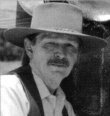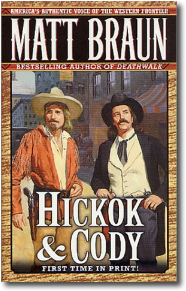"Hickok and Cody"
(Reviewed by Judi Clark SEP 23, 2001)
This novel of western heroes takes place in 1872 and combines fact with fiction, perpetuating the legends of Wild Bill Hickok and Buffalo Bill Cody.At this time in history, at least one-third of New York City's population was under the age of fifteen and at any given moment there were hundreds of thousands of orphaned, homeless children roaming the street. There were also hundreds of adults, mostly associated with religious organizations, that were dedicated to helping these children. However, those that were considered unredeemable were put on an Orphan Train which left Grand Central Station every Friday bound for the West. Along the way, the train would make stops and put these street urchins out on the platform for the farmers and ranchers to examine and consider for adoption. The only requirement for legal adoption was for the farmer or rancher to swear that the children would be raised in a Christian home and would never be mistreated.
Young Katherine and Augustus find themselves on one of these trains after being abducted while asleep in their Gramercy Park home. They are unclear as to why they are on the train, especially since they are unaware that they their parents were murdered the night of their abduction. To avoid adoption, in hopes that they can escape or that they will be rescued by their parents, the two of them pick fights on the platform and behave insubordinate until finally they come to a stop where their are more farmers than children. Katherine's fears are realized as Homer Ledbetter lays claim to the brother and sister.
Meanwhile Buffalo Bill Cody is entertaining the Grand Duke Alexis of Russia on a buffalo hunt of the Western Plains. Between jobs as a lawman, Wild Bill Hickok has also joined the hunt. This was a time when the Wild West was all the vogue with European nobility. Russia was a "friendly power" having aligned itself with the Union during the Civil War. Also five years earlier, the Grand Duke's father had ceded the territory of Alaska to the U.S. So not only were Cody and Hickok on this hunt, but so were six generals, including Custard.
It's when the hunt is complete and all parties merge at the North Platte, Nebraska train station, that young Augustus excitedly eyes the legendary "heroes of the plains." So it is Augustus that devises the plan to leave from the Ledbetter's sod house, escaping the petty tyrant, his crone of a wife and their bully son. Naturally the plan involves Hickok and Cody.
By juxtaposing the setting of this story between factual events in the Western plains and New York City, Braun brings to life this period when the West was becoming immortalized into legend by the more civilized East. I like the way that Braun points out the role of dime store novels and Ned Buntline's plays starring real Western heroes, as the vehicle by which we've come to view these legendary characters, but that said, here's another novel about the legend wrapped around the facts of the time.
Since the events of September 11th, many members of the newsgroups that I lurk on have discussed how hard it has been to read. Many are switching genres just to kick start themselves once again. I had read Hickok and Cody earlier in the summer and was already planning to post a review this month. But now I am even more eager to recommend Matt Braun's latest Western novel. It is set during a period of our country with much lore and heritage. Just as the Western dime stores novels were popular for the diversion they offered its reader, so it is that I recommend Matt Braun's Hickok and Cody.
(back to top)
Bibliography: (with links to Amazon.com)
- Black Fox (1972)
- Mattie Silks (1972) (reissue title: The Gamblers)
- The Savage Land (1973)
- El Paso (1973)
- Cimarron Jordan (1975)
- Bloody Hand (1975)
- Noble Outlaw (1975)
- Kinch (1975) (reissue title: Kinch Riley)
- The Kincaids (1976)
- Buck Colter (1976)
- The Second Coming of Lucas Brokaw (1977)
- Texas Empire (1977)
- El Paso (1978)
- Lords of the Land (1979)
- The Stuart Women (1980) (reissue title: Rio Grande)
- The Killing Touch (1983)
- Indian Territory (1985)
- Bloodstorm (1985)
- Tenbow (1991)
- Westward of the Law (1991)
- Texas Empire (1996)
- You Know My Name (1997)
- Gentleman Rogue (1999)
- Blood Sport (1999)
- Deathwalk (2000)
- The Shadow Killers (Feb 2000)
- Hickok & Cody (May 2001)
- The Wild Ones (January 2002)
- Overlords (January 2003)
- Black Gold (December 2003)
- Dakota (August 2005)
- Dodge City (May 2006)
Luke Starbuck Series:
- Hangman's Creek (1979)
- Jury of Six (1980)
- The Manhunter (1981)
- Deadwood (1981)
- Tombstone (1981)
- The Spoilers (1981)
- The Judas Tree (1982)
- The Last Stand (1998)
Ash Tallman Series:
- The Highbinders (1984)
- Crossfire (1984)
- The Wages of Sin (1984)
The Brannocks Series:
- The Brannocks (1986)
- Windward West (1987)
- Rio Hondo (1987)
- A Distant Land (1988)
The Gunfighter Chronicles Series:
- Wyatt Earp (1994)
- Outlaw Kingdom (1995)
- Doc Holliday (1997)
- One Last Town (1997)
Other Books:
- A Time of Innnocence (How Pearl Harbor Could Have Been Stopped) (1986)
- How to Write Western Novels (1988)
- Matt Braun's Western Cooking (1988)
(back to top)
Book Marks:
- Matt Braun's official Web site
- AuthorsDen interview with Matt Braun
(back to top)
About the Author:
 Matt
Braun is a fourth-generation Westerner, steeped in the tradition and lore
of the frontier era. His books reflect a heritage and lore with the truths
of the bygone time. Raised among the Cherokee and Osage tries, Braun learned
their traditions and culture, and their philosophy became the foundation
of his own beliefs. Like his ancestors, he has spent most of his life
wandering the mountains and plains of the West. His heritage and his contribution
to Western literature resulted in his appointment by the Governor of Oklahoma
as a Territorial Marshal.
Matt
Braun is a fourth-generation Westerner, steeped in the tradition and lore
of the frontier era. His books reflect a heritage and lore with the truths
of the bygone time. Raised among the Cherokee and Osage tries, Braun learned
their traditions and culture, and their philosophy became the foundation
of his own beliefs. Like his ancestors, he has spent most of his life
wandering the mountains and plains of the West. His heritage and his contribution
to Western literature resulted in his appointment by the Governor of Oklahoma
as a Territorial Marshal.
Braun is the author of more than forty novels an four nonfiction works, including Black Fox, which was made into a CBS miniseries, and One Last Town, which was made into a TNT movie called You Know My Name. Western Writers of America awarded Braun the prestigious Golden Spur Award for the The Kincaids. He is also the recipient of the Cowboy Spirit Award and was inducted into the Cowboy Hall of Fame in 1999.


